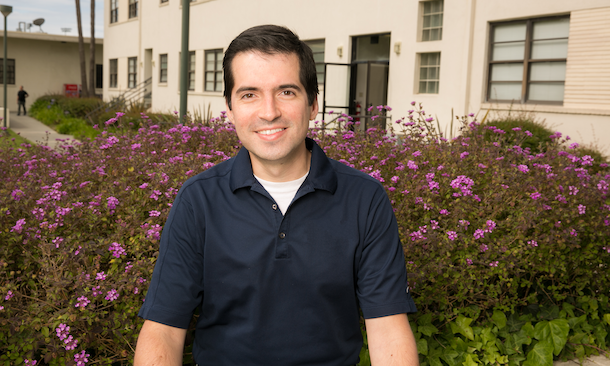Light the Way

Dr. Gustavo Vejarano, Associate Professor of Electrical and Computer Engineering, sheds light on electrical systems and their construction, inspiring his students to design and build innovative, practical technological solutions to enhance our everyday lives.
The key? According to Dr. Vejarano, it lies in mathematics.
“Summed up, I teach my students about the interaction of mathematics and the physical world,” Dr. Vejarano, who joined the top-ranked LMU Frank R. Seaver College of Science and Engineering in 2010, said. “We explore how math is used to model systems, more specifically cyber-physical systems, and how the discipline allows one to monitor the performance of these systems and the outcomes that follow.”
Dr. Vejarano describes his classes as “hands-on and collaborative” and says that once a student understands the implications of mathematics and their designs on the existing systems, they become very intrigued with the topics at hand and how to use these tools to build systems of their own confidently.
“In the end, an engineer has to deliver a working system that satisfies a set of requirements,” Dr. Vejarano said. “That system could be for communications, medical equipment, or it could be an autonomous system such as is used for autonomous vehicles, or a control system like what is used when dealing with robotics. It’s important to me to remind my students of what the implications of these systems and equations are in the real world, so they don’t lose that insight and connection.”
Dr. Vejarano’s research group at LMU is the Intelligent and Embedded Networks and Systems Laboratory (Intemnets Lab) and includes both undergraduate and graduate research assistants. In the Intemnets Lab, students conduct research under his direction on intelligent and embedded networked systems. For example, Vejarano and his student researchers are incorporating computer vision into drone networks to analyze what’s going on the ground below, which could prove very useful in monitoring wildfires. Their research has been published in journals and conferences of the IEEE (Institute of Electrical and Electronics Engineers).
On Saturday, November 20, prospective LMU students can plug into Vejarano’s teaching style and the electrical and computer engineering mindset by zooming in for the virtual Experience LMU Seminar Series session, “On the Evolution of a Cyber-Physical World, to Infinity and Beyond!” at 10 a.m., PT.
Vejerano says that during the session, he will talk about current technologies that utilize and benefit from cyber-physical systems and what can be expected from them in the future.
As for what advice Vejarano has for incoming LMU Lions?
“Take advantage of the many opportunities at LMU to collaborate and learn from your peers and faculty,” he said. “And as you set forth into your college experience, ask yourself, ‘how can LMU help me to use my unique talents to make an impact on the world?’ The answer to that is a process of discovery, but know that LMU, especially its faculty, has your back.”
Dr. Vejarano earned a B.S. in electrical engineering at Universidad del Valle, Cali, Colombia, in 2005 and his M.S. and Ph.D. in electrical and computer engineering at the University of Florida, Gainesville, FL in 2009 and 2011, respectively. In 2006, he worked for ZTE Corporation as an engineer to deploy a city-wide cellular network. During his Ph.D., he researched wireless communication networks at the Wireless and Mobile Systems Laboratory under Dr. Janise McNair's direction.